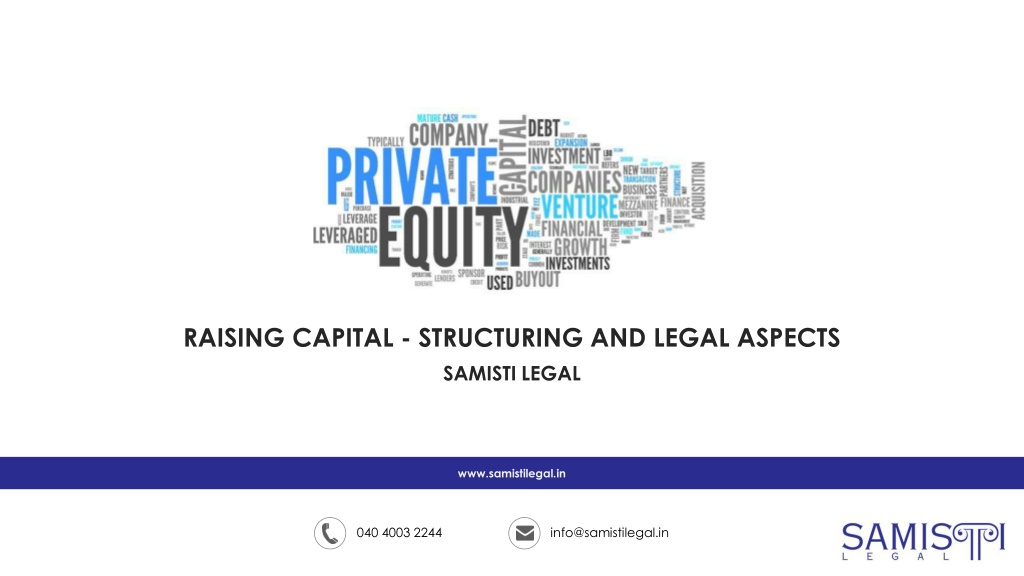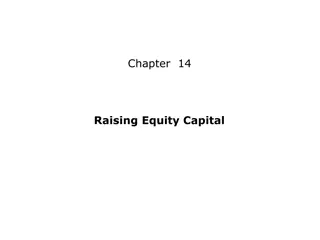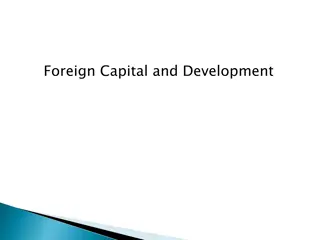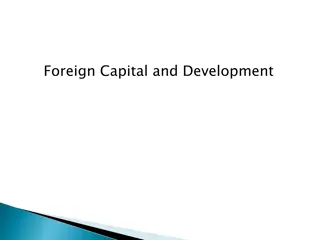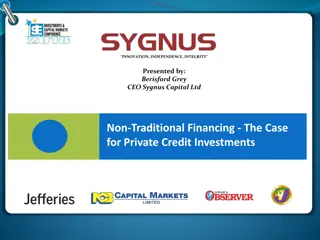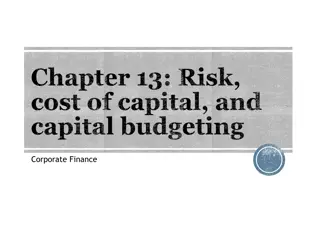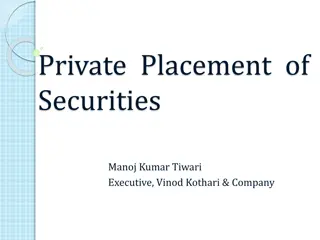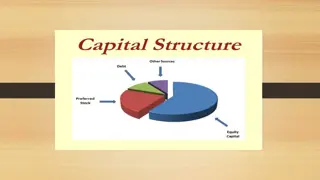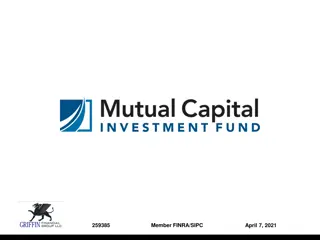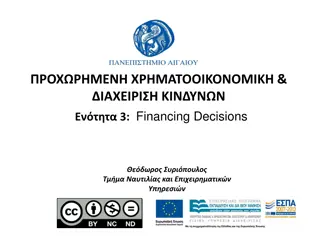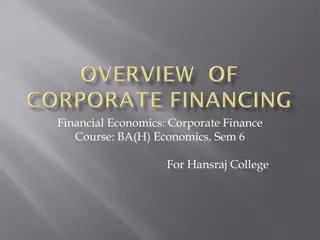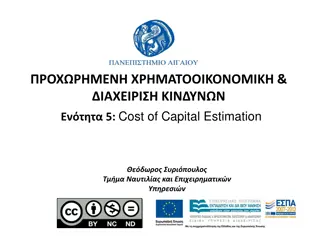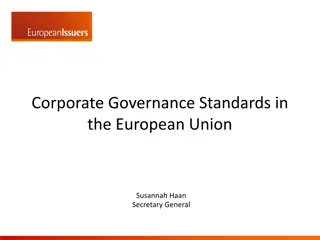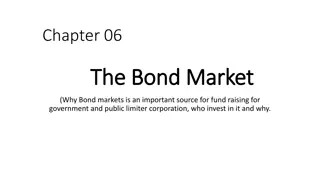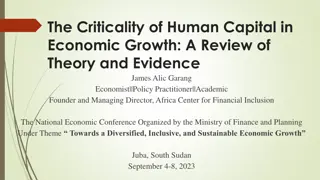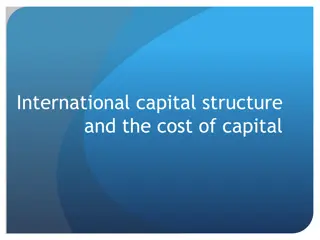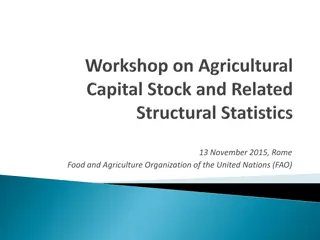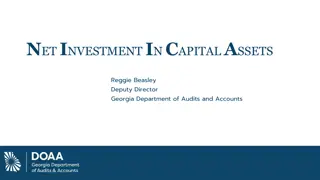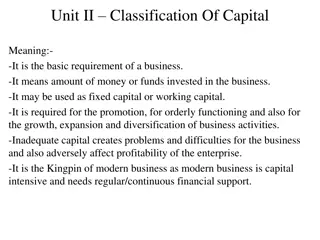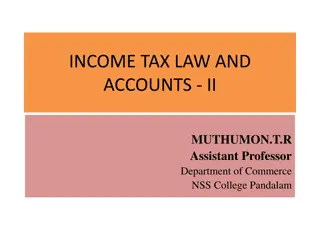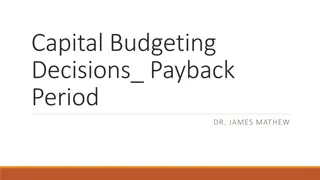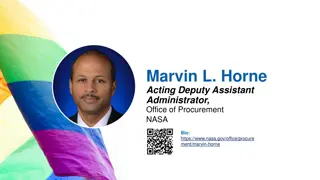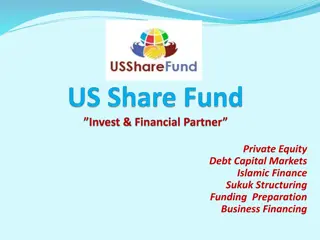Understanding Capital Raising and Legal Aspects in Private Equity Investments
Explore the process, key terms, and valuation aspects involved in structuring and raising capital through private equity investments. Get insights into the modes of investment, instruments used, and legal considerations for a successful investment journey.
Download Presentation

Please find below an Image/Link to download the presentation.
The content on the website is provided AS IS for your information and personal use only. It may not be sold, licensed, or shared on other websites without obtaining consent from the author. Download presentation by click this link. If you encounter any issues during the download, it is possible that the publisher has removed the file from their server.
E N D
Presentation Transcript
RAISING CAPITAL - STRUCTURING AND LEGAL ASPECTS SAMISTI LEGAL www.samistilegal.in 040 4003 2244 info@samistilegal.in
The Beginning 01 PE Investment Process and Estimated Time Period 02 Modes of PE Investment and Instruments 03 Agenda Valuation of Instruments 04 Key Terms - Term Sheet 05 Key Terms - Shareholder s and Subscription Agreement 06 Key Terms - Employee Agreement 07 PE Investor Clash with Promoters - Mitigation Plan 08 Case Study 09 2
The Beginning Get right advisor Prospect Identification Scope IMPLEMENTATION Plan Documentation and Market Negotiate and Closure 3
PE Investment Process and Estimated Time Period Prepare Business Plan and Marketing Collateral (1weeks) Shortlist and evince interest from the Investors (2 weeks) Structuring of Business (2 weeks) Resolving key findings from due diligence, if any (1 week) Valuation, Negotiation and Term Sheet (2 weeks) Due Diligence (2 weeks) Closing Formalities (3 weeks) Definitive Agreement (2 weeks) Funding (3 weeks) 4
Modes of PE Investment and Instruments Private Equity Investment Primary Investment Secondary Investment Direct Direct Equity Convertible Preference Share/ Debentures Warrants Equity and Other Securities 5
Valuation of Instruments Companies Act, 2013 Under Companies Act, price is determined based on valuation by a Registered Valuer (RV). Where convertible securities are issued, the resultant equity share price is determined: either upfront at the time of issue of convertible securities or Atleast 30 days prior to the date of entitlement to apply for shares, on the basis of valuation not earlier than 60 days of such entitlement. Foreign Exchange Management Act, 2013 The valuation of instruments is done as per internationally accepted pricing methodology duly certified by a Chartered Accountant or a SEBI registered Merchant Banker. Income Tax Act, 1961 The price shall not be more than the fair market value determined by a SEBI registered Merchant Banker. If shares are issued at a price in excess of the fair market value, it is taxable as per section 56(viib) under the head Income from Other Sources, with some exceptions. Section 56(viib) is exempted to a registered Startup i.e., if the issue price is in excess of the fair market value, the amount so raised will not be taxable. 6
Key Terms in a Term Sheet Background of the Company, Investors and Proposed Transaction Usage of Funds and Current Share Holding Pattern Valuation of the Company New ESOP Pool, if any. Customary Condition Precedent Anticipated level of management participation by the investor Pre-emptive Rights Anti Dilution Rights ROFO or ROFR Tag Along & Drag Along Rights Liquidation Preference Agreed time period for providing exit to investors Upside Sharing for Promoters, if any Nature of term sheet Non-Binding Cost Sharing Exclusivity Period Term Sheet Note for founders: Please involve a lawyer at the term-sheet itself! stage of 7
Key Terms in Shareholders and Subscription Agreement A Subscription agreement is a contract between the company and the investor laying down the terms of subscription/investment by an investor. A Shareholders Agreement is a contract between the company and all its shareholders which sets out their rights and obligations pertaining to their shareholding/investment in a company. Critical matters that requires negotiation in Shareholders and Subscription Agreement are as under: Management and Quorum Rights at Board meetings as well as Shareholder s meeting Board Seat Reporting by Key Employees Hiring and Firing rights of KMP Fall away of Rights Promoters Right to vote on critical matters in case he is not holding majority stake in the Company or terminated without cause Pre-emptive Rights Anti-Dilution Rights Weighted Average vs Full Ratchet Representation and warranties Disclosure Letter and Updated Disclosure Letter vis- -vis Specific Indemnity Knowledge and Materiality Qualifiers Insurance for Reps and warranties Time Period Shareholder s and Share Subscription Agreement 8
Key Terms in Shareholders and Subscription Agreement (Continued) Indemnity Time Period; Cap and Floor of liability De-minimus and basket Non-attachment of personal assets of Promoters except fraud, gross negligence or willful misrepresentation Transfer of shares and its restrictions Transfer restrictions on Promoters Lock-In, Inter-se transfer, carve out for liquidity Transfer restrictions on Investors Transfer to Competitor, ROFO/ROFR, TAG Right of first refusal versus Right of First Offer Structuring of Promote Sharing for Promoters Modes of sharing of Promote and tax implications Shareholder s and Share Subscription Agreement 9
Key Terms in Shareholders and Subscription Agreement (Continued) Liquidation Preference Determination of waterfall based on valuation at the time of Liquidity Event Events of Default and Consequences Breach of representations and warranties Non-obtainment of Investor approval for reserved matters Termination of Promoter for Cause Promoters convicted for fraud or violation of law or any material adverse change Consequences: Drag right (Full Vs. Partial), obligations of investors to fall off, promoter losing the board seat. Exit Mechanism Modes of exit- Strategic Sale, Third Party Sale, IPO, Promoter Lock in in case of IPO, IPO Waterfall etc. Failure to provide exit- Contractual breach Vs. Consequences of breach Non-compete obligation of Promoters Period, Geography and Coverage Shareholder s and Share Subscription Agreement 10
Key Terms of Employment Agreement for Promoters and Key Employees Employment agreement governs the relation between the entity and the key employees. Some of the key clauses which require careful consideration are as follows: Duties and Responsibilities Employment Agreement for Promoters and Key Employees Compensation, benefits and reimbursement policy Termination and its effects Severance Package Severance Package Non-Compete Obligation 11
Private Equity/ Investors Clash with Promoters Mitigation Plan REASONS FOR SPATE: Poor Due Diligence by the Investors Desperate Promoters versus demanding investors Promoters Sweet Spot Promoters Pushback on governance issues Promoter mindset of Control High-value Investments BEST PRACTICE FOR PROMOTERS TO MITIGATE RISK OF LITIGATING: The Company which is raising funds from private equity/venture capital players will mostly witness tight obligations and limited rights, with the promoters being liable for most acts, as the Investor decides to invest relying solely on the representations given by the promoters. Many issues come up while discussing and negotiating investment terms with the Investors. The promoter should hire a good legal counsel to negotiate the agreements to avoid any future surprises. 12
CASE STUDY A company ABCLtd ( Company ) has raised couple of rounds of funding and has few existing investors in the Company. Potential Challenges: FDI; Multiple Investors - Existing and New Investors Ongoing Litigations which might impact valuation of the company in future; Promoter may not continue to hold majority stake in the Company post investment; Structuring of Promote The Company intends to bring in further round of investments from a prospective investor who is person resident outside India . One of the potential mode of exit to the investors is envisaged to be by way of IPO of the Company. The Promoter also wants to structure promote mechanism in the agreement. The Company is also contesting couple of ongoing litigations including tax and others. The Promoter also proposes to create a new ESOP Pool. 13
CASE STUDY Promoter Perspective: FDI restrictions in the sector Rights of existing investors vis- -vis rights of the incoming investor Promoter Rights - Affirmative matters, Reporting by Key Employees Specific indemnity disclosure Investor Perspective: Due Diligence Exit bottlenecks Insurance for Reps and Warranties IPO- Categorisation, Waterfall and Lock-in 14
Thank You! Q&A 15
Prashant Jain Email: prashant@samistilegal.in Phone: +91 9553688330 Office No. T 202, Technopolis, 1-10-74/B, Above Ratnadeep Super Market, Chikoti Gardens, Begumpet, Hyderabad, Telangana 500016 Email: info@samistilegal.in Phone: 040 4003 2244 16
